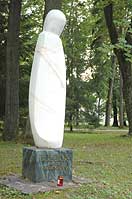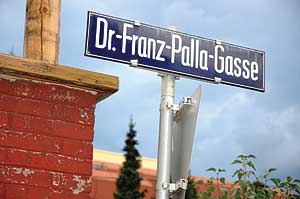State hospital
 Even before the period of National Socialism the idea of terminating "worthless life" was talked about openly in juridical and medical magazines. In the NS period economical reasons were used as primary argument for "forced euthanasia". The mentally and physically handicapped were merely called a "cost factor" and as such useless for the "community". A further reason given was the "elimination of hereditary diseases and bad genes". In Carinthia almost a thousand persons were murdered and even more transported to "euthanasia facilities" like the one in Hartheim near Linz, and murdered there as part of the NS Euthanasia Programme.
Even before the period of National Socialism the idea of terminating "worthless life" was talked about openly in juridical and medical magazines. In the NS period economical reasons were used as primary argument for "forced euthanasia". The mentally and physically handicapped were merely called a "cost factor" and as such useless for the "community". A further reason given was the "elimination of hereditary diseases and bad genes". In Carinthia almost a thousand persons were murdered and even more transported to "euthanasia facilities" like the one in Hartheim near Linz, and murdered there as part of the NS Euthanasia Programme.Even in the hospital itself approx. once a week critically ill persons were murdered in the so-called Gausiechenhaus, today the geriatrics department in the Krassnigstraße. After the stop of "euthanasia" was demanded mainly in Catholic circles, the mass murdering of the mentally ill was reorganised. From 1942 on it took place in decentralised hospitals - namely anywhere staff would consent to do it. This was also the case in Klagenfurt's Gaukrankenhaus. At the beginning, the senior psychiatrist Dr. Franz Niedermoser had people killed by injection in the psychiatric department of the hospital itself, later on they were sent to the Siechenhaus' rear building in groups, where the murderings attracted a lot less attention.
In addition hundreds of forced sterilisations and forced abortions took place in Klagenfurt's Hospital. On the one hand this was done in order to avoid the female forced labourer's absence due to pregnancy, on the other hand to avoid the spreading of "hereditary disease". Among others Dr. Franz Palla. was responsible for the forced sterilisations and forced abortions. Unlike Dr. Franz Niedermoser he was never put to trial, instead, a street was named after him in the immediate vicinity of the state hospital which still bears that name today. Since the mid 80s efforts have been made to bring back to mind the "forgotten" victims of NS medicine. In 1988, as part of the effort to make the psychiatry more open and transparent, a monument was inaugurated on the grounds of the state hospital to commemorate the victims. The memorial with the writing "for the victims of national-socialism in Klagenfurt's phsychiatry" at Klagenfurt/Celovec's state hospital is one of the few exceptions in the context of Carinthias remembrance policy in that it remembers actual victims.
